Peter MALONE
Saturday, 18 September 2021 19:48
Cotton Club, The
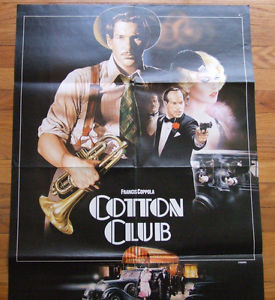
THE COTTON CLUB
US, 1984, 125 minutes, Colour.
Richard Gere, Diane Lane, James Remar, Bob Hoskins, Lonnette Mc Kee, Gregory Hines, Nicolas Cage, Fred Gwynne, John C.Ryan, Laurence Fishburne, Alan Garfield, Jennifer Grey, Gwen Verdon, Mario van Peebles, James Russo, Joe Dallessandro.
Directed by Francis Coppola.
The Cotton Club was an ambitious film for Francis Ford Coppola. He had achieved fame with the Godfather films as well as Apocalypse Now. During the 1980s he made more stylised films, like The Outsiders, Rumble Fish as well as the stylised musical, One from the Heart. The Cotton Club is in this vein.
The film is set in New York City in the late 1920s, early 1930s, focusing on the Cotton Club in Harlem. Central to the film is Dutch Schultz, a starring role for character actor, James Remar. He portrays the gangster as arrogant, as well as cruel. Diane Lane portrays his mistress, also an ambitious woman who wants to have her own club and achieves it. Richard Gere portrays a young man from an Irish Catholic family (with Nicolas Cage portraying his younger brother, and dancer Gwen Verdon playing their mother). Richard Gere’s character has to act, reluctantly, as a bodyguard for the mistress, while falling in love with her. There is also acknowledgement of the movies, with Gere becoming a matinee idol.
The film is filled with many character actors, re-creations of gangster sequences, punctuated by song and dance routines, with Gregory Hines and his brother showing their tap dancing skills. There is also Cab Calloway and his song, Minnie the Moocher.
The film seems better in retrospect and it is always interesting to see young talent at the beginning of their careers and in the light of the subsequent careers.
1. Francis Ford Coppola and his career? This film and the continuity of his career? Style, his studio, his interest in New York gangsters?
2. The title, the club in Harlem, the other clubs in New York City, 1928 to 1934, the owners of the clubs, their connections with gangsters, the audiences: white audiences, black performers? The world of jazz, the range of songs, dance, choreography, Cab Calloway and Minnie the Moocher? American history? New York history?
3. The range of the cast, careers, stars of the future making their initial mark? The singers, the dancers?
4. The musical score, the songs, the range, many still popular, echoing the 1920s, the 1930s? Their insertion throughout the film? Action then music, intercutting, Coppola style of intercutting action with music? The songs giving the audience space to reflect on what was happening? The end?
5. The gangsters and New York City, the numbers rackets, the violence, fighting, the Italians, the Irish, the Jews? The fights for power? Sudden murders? The world of crime in New York, the police? Prohibition, the work of the government?
6. James Remar as Dutch Schultz, his power in New York, his retinue accompanying him all the time, their personalities and characters? Owney, the deals with Schultz? Yet the antagonism? Schultz and his wife, taking her to the shows, the trophy wife? His relationship with Vera, his mistress, commanding her? The explosion, Dixie saving him? His appointing Dixie as Vera’s protector, Dixie and his life, service to Schultz, in the motion pictures? Vincent, his wanting to work for Schultz, his offsider, succeeding, brutality? The vision the vicious murdering of the Irish gang leader, his taunts against Schultz, Schultz breaking out violently? Schultz and his many enemies? Owney and his arranging discussions with Lucky Luciano? The build-up to the execution of Schultz? Death in the toilets?
7. Dixie and Vera, Vera and her background, singer, mistress to Schultz, in the club, accompanying him, the explosion, Dixie and his action, Dixie appointed to be Vera’s protector, taking her home, the sexual attraction? Vera and the life depending on Schultz, obeying his commands, her ambition in getting the club? Her success? Singing there? her interactions with Dixie? His being a musician, playing the cornet, action for Schultz, his not wanting to be dependent on Schultz? His relationship with Vincent? Vincent and his choosing to be a gangster? His wife? Dixie trying to protect him? The meal at the club, the family, his mother, her musical background? Dixie and his continuing to play?
8. Dixie, Gloria Swanson, motion pictures, the casting agent, acknowledging that he could not act, but was photogenic? The screen test? His career, the film Mob Boss, his becoming a celebrity? Owney and his help? Schultz and his dependence but also his disdain?
9. And a beer at the end, I am a career, the club, the threats, shorts being stupid again death, they’re leaving for Los Angeles question? Are
10. Vincent story, relationship with his brother, with the family, his wife, his associate, the issue of money, the abduction of Frenchy, let him go, the dealer, his death?
11. Sandman Williams, his brother, their ambitions, at home, dancing the club, audition, is attraction towards Lila, flirting, the bouncer and his continued antagonism? Sandman’s brother, the separation, separate careers, Sandman making progress, the up and downs of his career, the reconciliation with his brother? The quality of the tap dancing and what it brought to the film of the atmosphere of the Cotton Club?
12. Lila, passing for white, singing of the club, the attraction towards Sandman, the ups and downs of their relationship, the marriage, separation, the criticisms? A living, are singing from Vera? The reconciliation with Sandman?
13. Only, his character, only the Cotton club, Association of gangsters, his friendship with Frenchy? The range of deals, with shorts? Why not liking him? Is finally meeting Lucky Luciano, Luciano and the plan against Schultz? His being ready to go to jail? And being prepared for a short sentence?
14. The abduction of Frenchy, the way that he was treated, the clash with Vincent, the wound to his ear, his continued faithful work for only? The loyal gangster?
15. The re-creation of this world, have glamourised? A deadly and wilful world? The importance of money? Sex? Violence? As seen in the papers? In the developing movies? The audience treated to a glimpse of this world and making up its own mind?
Published in Movie Reviews
Published in
Movie Reviews
Tagged under
Saturday, 18 September 2021 19:48
Free Money
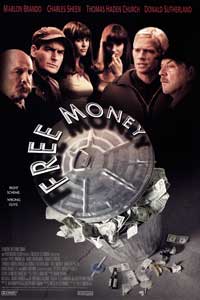
FREE MONEY
US, 1998, 91 minutes, Colour.
Marlon Brando, Donald Sutherland, Charles Sheen, Thomas Hayden Church, Mira Sorvino, Remi Girard, Martin Sheen.
Directed by Yves Simoneau.
Free Money is a little heard of comedy, eccentric and often over the top.
Marlon Brando made the film at the age of 73 towards the end of his career. He plays a buffoon warden of a prison, with two adoring twin daughters, ruling the roost in his own way with the comments of religiosity. He also has yellow ginger hair and moustache. And he also has his considerable bulk. Brando allows himself a great deal of slapstick.
His two sons-in-law are played by Charlie Sheen (as Charles Sheen), and Thomas Haden Church. They are not so bright and under the thumb of the warden. An opportunity comes to rob a train, with used notes coming from Canada to the United States. The robbery is farcical even as it is successful. But there are consequences and Charlie Sheen finds himself in prison after spending the money in an obvious way. There is a plan for an escape, knocking out the warden, getting away in his truck. It almost works but there is a further police chase.
Also in the cast is Donald Sutherland as a local corrupt judge, a minor role in the film. His FBI agent daughter is played by Mira Sorvino, who plays her part straight and it is all the better for it, even if she is bashed on the head by Marlon Brando.
A final joke with Martin Sheen as the new warden and Brando a prisoner – memories of their roles in Apocalypse Now.
The film was directed by Yves Simoneau, director of a range of thrillers and dramas.
1. A generally unknown film? Yet, the star cast? Something of a cult comedy?
2. A last role for Marlon Brando? His comic style? At the end of his career?
3. The title? The robbery of the money on the train? The consequences?
4. The northern United States? The town? A certain isolation? The centre of the town, shops and garages? The prison? The court? The musical score?
5. The Swede, his presence, size, the colour of his hair and moustache? His dominance at home, his two daughters? Their news about pregnancy? His thunderous reaction? Encounter with the men, his reluctant presence at the wedding? His love for his daughters, their devotion to him, their returning home with their husbands? His laying down the law, one cooking and cleaning, the other repairs? His religiosity, no swearing, sins of fornication? His regulations in the house about sexual meeting? Punishment?
6. His role as the warden, in the jail, his underlings, the escapee, phoning the judge, shooting the criminal? The connivance of the judge? Their later
huddle for conspiring?
7. His love of the truck, its being stolen, his reaction?
8. Bud and Larry, the relationship with the girls, the girls telling them they were pregnant, the weddings? The two not knowing each other, in the same house? The joke during the honeymoon night? Larry imitating the Swede’s voice? Useful later for the escape?
9. The bar, the guard on the train, the story of the money coming from Canada? The plan?
10. The plan in action, the vehicles, stuck in the mud, Larry in the car on the rails, the guards not noticing, playing cards, the crash, the explosion? Their not wanting to take the blame? The lame answers? The interrogation by the FBI agent? Bud and Larry, getting the money, the escape, getting back home? The rescue of the truck?
11. Larry, tentative, not so bright, criticising Bud for the plan going awry? Bud spending the money, the Swede seeing him? Contact with the judge? The
arrest? Larry free?
12. The FBI agent, daughter of the judge, estrangement? Questioning of the Swede, his vague answers? Her coming to the court, to the prison to see Bud, trying to persuade him to incriminate the Swede? His refusal? His sentence? A speech in the court? Her father ousting her?
13. The judge, his role in the town, authority, collaboration with the Swede? Alienation from his daughter, meeting at the social? His condemnation of her in the court?
14. The daughters, wanting to get married, stories of the pregnancy, one of them not pregnant? Their flirting with other boys in the town? The Swede getting the quick divorce for Larry?
15. The brutality in prison, the giant fighting Bud, his losing his eye, Larry and the plan, knocking out the Swede, the announcements, in the truck, the pursuit by the police, the slapstick of the pursuit? The FBI agent at the end? The Swede putting them in the garbage truck? The Swede bashing the agent? Her letting Bud and Larry go?
16. The Swede in prison, the joke with Martin Sheen and Brando as the next warden?
17. The Butch Cassidy and Sundance Kid quotes, Bud and Larry at the end – and the new set of twins and their father?
Published in Movie Reviews
Published in
Movie Reviews
Tagged under
Saturday, 18 September 2021 19:48
Are We Officially Dating/ That Awkward Moment
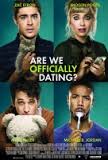
ARE WE OFFICIALLY DATING?
US, 2014, minutes, Colour.
Zac Efron, Miles Teller, Michael B. Jordan, Imogen Poots.
Directed by Tom Gormican.
Wild oats seem to be getting wilder – but young people are still sowing them, and profligately.
This is a film about 20-somethings for 20-somethings. As Danny Glover said (often) in the Lethal Weapon films, ‘I’m too old for this…’.
If The Wolf of Wall Street can be described as a ‘cautionary tale’, then this, in its minor way, is the same kind of tale for its (probably) eager audience.
Three friends have a code (that’s dignifying it) where they have a list of women they liaise with – but no real relationships or commitment. This allows for some sex moments with touches of sleaze.
But, you expect that, this being an American film, this will not last and the three men will learn that traditional love, relationships and commitment are what is truly worthwhile.
The three are played by Zac Efron as the leader, Miles Teller as the obvious sleaze and Michael B. Jordan who, at the end, seems left high and dry after the failure of his marriage.
So, this is mostly looking at the three friends, Zac Efron living up to the code until he realises that he has fallen in love, Miles Teller secretly in a relationship, Michael B. Jordan secretly trying to revive his marriage.
And, that’s it, until the next similar film turns up – and it will soon.
1. A film for twentysomethings? Their hedonistic way of life? The 21st century and the ways of sowing wild oats? A cautionary tale for the intended audience? The moral ending?
2. The original title, That Awkward Moment? Which moment? The alternate title, Jason and his reaction to the breakup and asking this question?
3. The world of the twentysomethings, the apartment and sharing, visits to the clubs, the workplace and cover design? Mikey and his work as a doctor at the hospital? The mix of ordinary living and the goals of pleasure-seeking? The musical score?
4. The touches of the outrageous, nudity, sex, the phallus, language? Its effect? Jerky?
5. The pact, the list, the contract and pledge? No relationships?
6. Jason is leader, his age, character, the initial relationship and the girl breaking up and his not knowing? The sexual encounters with Alana? With Daniel and confiding in him? Sharing with Mikey? The long-term friendship? Meeting early, the man hitting on her at the bar, Jason’s speech on the brush off? The night with her? The previous discussion about prostitutes and the article with the signs? Jason seeing them in the room, leaving suddenly? Going to the job, with Daniel, the cover with issues and the speech about the attraction to women? Ellie, her rival, the speech? Jason and his apologies?
7. Jason, his relationship with her with Kelly, sharing with her, in love, but not seeing it or admitting it? Going to the birthday party, the singlet, the large phallus, in her mother’s drink…? The parents and their reaction? The death of Ellie’s father, his not going to the funeral? The effect on her? Meeting with her, the apology, saying that friends responded in times of need, his shame? Change?
8. Daniel, loud, with women, meeting Chelsea, her willingness to be in a relationship, their meetings, sexual encounters, a true relationship, going to the party, her parents, the sexual encounter in the other room, Daniel’s arrival? His being exposed? Admitting his relationship with Chelsea?
9. Mikey, his wife, discovering the affair, the lawyer? His work as a doctor? The plan to the divorce? Vera coming to see him, re-connecting? His love for her? The sudden failure – credible? And his being left high and dry at the end?
10. The discussion about the list, emotional and sexual immaturity?
11. Jason sitting on the bench, the encounter with Ellie, going to the reading, Jason’s long speech, quoting Ellie and her talking to him? Ellie joining him on the bench?
12. One of those American cautionary tales, wild oats, a touch of maturing, commitment and fidelity?
Published in Movie Reviews
Published in
Movie Reviews
Tagged under
Saturday, 18 September 2021 19:48
Raining Stones
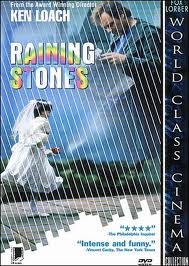
RAINING STONES
UK, 1993, 90 minutes, Colour.
Bruce Jones, Julie Brown, Ricky Tomlinson, Tom Hickey,
Directed by Ken Loach.
Raining Stones is one of Ken Loach’s most typical films and very characteristic of his interest in ordinary people and the working class.
Loach made a great impression in the 1960s with his television dramas, including Cathy Come Home, as well has his early venture into cinema with Kes. For more than 50 years, Loach has produced numerous films, features and documentaries, and has contributed to the social consciousness of United Kingdom and beyond. It is interesting to note that Loach has received more awards than any other director from Ecumenical and SIGNIS juries.
From the early 1990s, Loach has made many films, with a ride range of social concerns.
This film is set in Manchester, highlighting poverty, unemployment, rogue behaviour by men out of work (stealing whatever they can, including sheep, selling the meat in the pubs). The film also highlights family, trying to cope with financial difficulties and the education of their young daughter. The Catholic church also features strongly in the film, the central character a devout Catholic, friends with the local priest. The local priest is certainly a very interesting character, participating in the training of the children for First Communion, chatting with his friend, giving him advice about not spending money on an elaborate First Communion dress, and receiving him with kindness when the loan shark dies in an underground parking lot.
There is a lot of humour in the film, especially in the family conversation discussing the nature of what happened in the Last Supper. And Ricky Tomlinson who appeared in Loach’s Riff Raff and went on to television fame in the royal family The Royle Family, has a lot of humorous moments.
But, the difficulties in employment, the dependence on loan sharks and their ruthlessness and threats to physical violence for families, means that there is a lot to take seriously in the film.
The screenplay was one of the last written Jim Allen who srote a number of Loach films, including the Spanish Civil War film, Land and Freedom, who has a strong sense of social justice and a strong sense of the life of the Catholic Church.
With his succeeding films, Loach relied on screenplays by former seminarian, Scots writer, Paul Laverty, starting with Carla’s Song in 1996.
1. A Ken Loach film? His career, social concerns over almost half a century? Slices of life?
2. The 1990s, social issues, employment and unemployment? Families?
3. The religious dimensions of the film, the Catholic church, Bob and his wife as devout, going to church, concerned about their daughter, the First Communion, wanting the best? Bob and his relationship with Fr Barry?
4. The locations, atmosphere of the mountains and the stealing of the sheep, contrasting with life in the town, the butcher, the neighbours, building sites, pubs, homes? The musical score?
5. The opening and Bob and Tommy with the sheep, the comedy, the introduction to stealing and the needs of the poor? Bob unable to kill the sheep? Taking it to the butcher? Mutton, the killing, Bob and Tom going round the pubs and cafes trying to sell the meat? Bob’s truck, it’s being stolen, Tommy leaving the keys in the truck?
6. Colleen, in the church, reading aloud about First Communion, her mother of the of the parents, the children, Fr Barry and his praise for Colleen? The details of preparation for Communion, not spoiling her love for Jesus, no drinking for one hour, listening carefully to the priest? The priest and his talk about Mother Church, age of reason, preparing for Communion, the parents preparing and teaching, a beautiful friendship with Christ? The initial picture of Fr Barry?
7. Bob at home, Anne and her being upset about the van stolen? The discussions about the Communion dress, the shoes, the amount of money?
8. Needing the truck, scaffolding jobs? Cleaning the drains? The collage of people turning him down, Fr Barry, the drain done for free, Bob and his being covered in shift, Fr Barry and clothes, the cup of tea, talking confidentially? Advising him not to buy the Communion dress, offering one from the parish, Bob and his pride, comparisons with the wealthy, wanting Colleen to have the dress for a most important day? Fr Barry saying that every man had a right to work?
9. Bob and his love for Anne, their arguments, the difficulties, the scene in the bedroom, Anne on the pill and her feeling she had committed a sin?
10. Bob going to the office, the discussion with his brother-in-law? The help? The contrast with Tommy and the helicopter, and his yelling out for a revolution?
11. Tommy, at home, his boys and their uniforms, playing soccer, his daughter and the loud music, that chat, his wife, the money issues? The irony of the club, the daughter and her drugs, Bob encountering her?
12. Going to the shop, the decision to buy the full outfit after looking at everything, not thinking about it? The follow-up with the scene at the meal, Bob trying to teach Colleen, the night before Jesus was crucified, the meal with his mates, a big tea, Jesus going to die? Colleen asking how did he know.? Because he was Christ! The wife starting to teach, Bob explaining the bread, holding it up, giving it to mates, this is me, then taking the cup – and asking Anne what was next? The discussion about this is my blood, not real blood, the cup of wine and being both blood and wine? Bob asking Colleen if she understood? Her saying no? His discussion about heaven, saying you couldn’t get in if you didn’t have Communion? Colleen still saying she didn’t understand? Bloody hell!
13. The application for the security job, the uniforms and their stinking, the jokes with the group, the conditions, going to the club, the dancing, Tommy’s daughter, the fight, his being sacked? The next job – and the stealing of lawn pieces from the Conservative Club?
14. The brother-in-law, saying religion was mumbo-jumbo, a few Hail Mary’s not fixing everything, saying Bob was walking around with guilt? His decrying the situation: no work, no hope, despair, drugs?
15. Buying the new van, the money deal, beginning again? The thugs bashing and Bob intervening? The women talking?
16. The loan sharks, the violence, and the intrusion into the house, the verbal violence towards Anne and the threats towards Colleen? The personality of the loanshark, his viciousness?
17. Anne trying the sewing job, her not being good at it?
18. Bob, his anger, getting the spanner, the attack on Tansy at the club, the fight in the car park, Tansy getting away and crashing? Bob taking his black book with the names and debts?
19. His going to Fr Barry, Fr Barry’s welcome, with coat and no collar, an ordinary man and priest? Asking what happened, sitting down in the kitchen, the explanation of the accident, Fr Barry hearing about Tansy and his loans? Fr Barry saying he thought Bob had more sense? Giving him the drink, Bob giving the book to Fr Barry and his burning it? Bob declaring he was a good Catholic, belief, going to church, but unable to put food on the table? Fr Barry’s advice, keeping the information to themselves, not telling Anne, not going to the police? why sacrifice of life for a worthless soul? Inviting Bob to confession, in the kitchen, in the name of Christ the bread of life? The verdict that Tansy was drunk on drugs and would have crashed the car by himself?
20. The church, Mass, the consecration, lay ministers, the distribution of Communion, the first Communion?
21. The photos, the group, Bob anxious, the police passing? The irony that his van had been found?
22. A detailed slice of life in the English cities of the 1990s?
Published in Movie Reviews
Published in
Movie Reviews
Tagged under
Saturday, 18 September 2021 19:48
We are the Night/ Wir sind die nacht
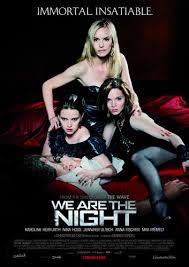
WIR SIND DIE NACHT/ WE ARE THE NIGHT
Germany, 2010, 98 minutes, Colour.
Nina Hollis, Jennifer Ulrich, Karoline Herfuth, Max Riernelt.
Directed by Denis Gansel.
We are The Night was written and directed by Denis Ganwel, director of the very interesting films, The Wave and The Fourth State.
The film’s main appeal will be to those who like the vampire films, this one a variation on the theme with a group of female vampires. While some historical background is given about their eternal life and their eternal search for a mate, the action takes place in Berlin in the 21st century, especially at night.
Distinguished German actress, Nina Hollis (Yella, Jerichow, Barbara, Gold) is Louise, the leader of the group, who finds her soul-mate in a homeless girl, Lena. Lena resists at first but is transformed into a vampire. Her conflict is with the young policeman who pursued her when she was a pickpocket on the streets and has begun to fall in love with her. He is wounded in a pursuit and has to make a choice about his future, on earth, or with Lena.
1. A German vampire film? A vampire film with a difference? Contemporary? Women?
2. The Berlin setting, days and nights, more action in the nights? The historical background, the vampires in the 18th century, the visuals? The 21st century, the plane and its interior, shoppers’ behaviour and the deaths? the clubs, the homes? The police precincts? The streets and crime? The bridge? Night and darkness, the sun and its power on the vampires? The musical score in contemporary songs?
3. Louise as the leader of the vampires, a past history, the introduction and the talk about searching for the perfect mate? Louise and her group, going to Paris, the shopping, Charlotte and her reading the book, Nora and her music and noisiness? Their life as vampires? The explanation of the elimination of the male vampires?
4. Lena, her disguise, the attack on the man in the street, robbing him, the pursuit by the police, her eluding them, sitting on the bridge, Thomas talking to her, recognising her, her escape? Her spoiling the sting on the pimps? The later deaths in the prison?
5. Louise, rescuing Lena, menacing her, eventually transforming her? Lena and her fear, being bitten, the blood, sleeping, distaste of food, the bath and her being healed, her complexion, her head? Becoming part of the vampire group?
6. Thomas, is police work, his superior officer, Thomas not having a private life, the attraction towards Lena, the contact with her, her flight, her desperate phone call to him, coming to her rescue, the finale and the confrontation, his being wounded, his having to make a decision, vanishing with her? The police officer, his wishing him well?
7. The club, the sensuality, sexuality? Lena and her ambitions? Nora, the music? Charlotte and her continued reading? Norah and her being burnt by the sun? Louise not rescuing her? Charlotte and her decision to die by the sun?
8. Lena and Louise, the struggle, Louise out of the building, catching fire?
9. An interesting vampire story, variation on the themes?
Published in Movie Reviews
Published in
Movie Reviews
Tagged under
Saturday, 18 September 2021 19:48
Wind Rises, The/ Kaze Tachinu

THE WIND RISES /KAZE TACHINU
Japan, 2013, 126 minutes, Colour.
Directed by Hayao Miyazaki.
The Wind Rises received award nominations, including for the Golden Globe for Best foreign Language film. It is the final film of celebrated animator, Hauao Miyazaki, noted to such films as Howl’s Moving Castle and Ponette by the Sea. He also received an Academy Award for his animation film, Spirited Away.
This film is quite different from his previous films which led the audience into worlds of fantasy and magic, human beings but also strange animals, immersed in the Japanese countryside and the seaside, but accessible to Western audiences (and mostly dubbed by American actors of some note for the international release).
This time the focus is on the human, especially a young boy, Jiro, who is fascinated by planes. It is the 1920s, the era of development of aircraft, the beginnings of commercial aviation, and the design of planes which could be used in warfare.
It is somewhat disconcerting for a Western audience to watch this film, the story of a young man who contributed to Mitsubishi’s development of planes that were used in World War II, confronting the allies, contributing to the kamikaze ethos of the Japanese pilots, and contributing to many deaths. However, it is a film which takes the Japanese audience back into its past, an audience sometimes reluctant to consider the aspects of World War II, like this, and highlights the ambiguity of attitudes of the period and later.
Jiro goes to the University, but in a very dramatic sequence, he experiences the great fire of 1923. It must be said that the animation for the sequences is most impressive, far from the world of fantasies, rather grim pictures of the extent of the fire, the population and their terror, Jiro and his rescue of two young women from the fire. They search for him but do not find him – yet, after a long search, he is found in the latter part of the film, which forms the basis of a romantic story, complicated by the fact that the young woman that Jiro loves is suffering from tuberculosis and has to stay in a sanatorium.
In the meantime, a great deal of the film is devoted to Jiro and his research, working with a friend, collaborating with the Mitsubishi boss. During the 1930s, the two are sent to Germany where they examine the planes, under the auspices of the designer, Junker, and experience some hostility from the Germans who see themselves as superior to the Japanese.
The film also introduces the Russians and has subplots indicating the espionage network of the 1930s.
Jiro is an engaging hero, something of a nerd of his time, lost in his books, in his imagination and world of design, bespectacled. His love for the young woman changes his life – and gives something of a moral to the film where people design planes that can be used as weapons and instruments of war whereas their motivation is for peaceful and profitable use, and the realisation that love is the most important experience.
There is an interesting fantasy in Jiro’s imagination – the presence of an Italian designer who encourages Jiro, develops all kinds of fascinating planes which, eventually, fail. However, he is an inspiration Jiro.
And interesting that late in a significant career, contributing to Japanese animation for over a quarter of a century, and introducing it to international audiences, that Miyazaki has chosen to tell this Japanese story.
1. The impact of the film? Awards? For Japanese audiences? For audiences outside Japan?
2. The career of Miyazaki? His animation studio? His films? There themes? Fairytales? The bright colours, the beauty, characters? Musical score?
3. The blend of fantasy and realism? The option for some realism here? The history of Japan in the 20th century? The earthquake and fire of 1923? Preparations for World War II? The collaboration with Germany? Disasters, the planes, factories, flight and the attention to detail? World War II, the destruction of the planes and the pilots?
4. Japanese look at Japanese history? The perspectives on the 1920s and 30s after the bombing of Pearl Harbour? Japanese waging war? Japanese looking back? Acknowledging the realities? The critique? The focus on the development of planes? The travel? Not for war? Their use in war and the destruction and consequences? The option for love and humanity? Some audiences critical of the film as being too pro-Japanese?
5. Jiro and his place in Japanese history? Aviation? Skills and talent? This story based on his life but not following it accurately? A blend of realistic recounting and fantasy of what might have been? As a young boy, his family, his friends, at school? Awkward in his manner and appearance, his glasses? Studious? His dreams? Planes? The gift of the magazine about aviation? The continued appearances of the Italian inventor, his mentor? The flight?
6. Jiro as an adult, his studies, his friends, his work in design, a blend of work and study? At home, his mother, his sister and her cantankerous attitudes towards her brother?
7. Jiro returning to school, the earthquake of 1923, the consequent fire, the detail in which it was visualised? The crowds, fears, the flames and destruction? The woman collapsing, the girl? Jiro coming to the rescue? Carrying the girl, finding their home, his disappearance? Their searching for him?
8. As a character, look, a boffin, glasses, continually smoking, quietly in his room, his relationship with his friends?
9. Mitsubishi, the boss, his manner, his wife, plans and contracts, board meetings, discussions, Jiro and his presentations? His gradual promotion? The long relationship with the boss?
10. He and his friend being sent to Germany, the experience of the Germans, their skills in making planes, their treatment of the Japanese, looking down on them? Admiration for Junker, his help, their experience of the planes,
11. The meeting of the anti-German man? The Soviet spy? His comments and criticism?
12. Finding Naoko, sharing memories with her, her father, the hotel, the meals, love, explaining that she had tuberculosis, decisions about their marriage?
13. Changes in Japan, the development of the planes, the test flights, his friend and his developments, the progress? Jiro and his theories?
14. His sister coming to find him, still being cantankerous? Her friendship with Naoko, Naoko going to the sanatorium? Jiro and his trips to see her, her return trips? Her father? The hospital?
15. Love, marriage, Naoko and her illness, Jiro and his love and support?
16. The scenes with the Italian inventor, his planes, his ambitions, their styles, their failures and crashes? His appearing to Jiro at the end? Supported him? His death?
17. The portrait of Jiro, via animation instead of real-life performance? The different impact through animation? And of Japan, and of the 1920s and 30s and the preparation for war? Scenes of flight? The film as a tribute to Jiro – and his values and ideals?
Published in Movie Reviews
Published in
Movie Reviews
Tagged under
Saturday, 18 September 2021 19:48
Jack Ryan: Shadow Recruit
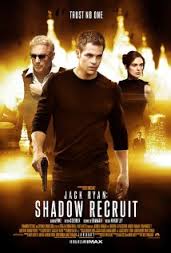
JACK RYAN: SHADOW RECRUIT
US, 105 minutes, 2013, Colour.
Chris Pine, Kevin Costner, Kenneth Branagh, Keira Knightley.
Directed by Kenneth Branagh.
This film will probably not be on Vladimir Putin’s must see list. But, by the last scene, it will definitely be on President Obama’s list.
It is an action thriller, an espionage drama, based on characters created by Tom Clancy. In fact, Jack Ryan appeared on screen almost a quarter of a century ago in the form of Alec Baldwin in The Hunt for Red October. He was then portrayed by Harrison Ford in two films during the 1990s, Patriot Games and A Clear and Present Danger. His previous incarnation was by Ben Affleck in The Sum of All Fears ten years ago.
This time round it is a much younger Jack Ryan. He is played by Chris Pine who has come to substantial screen presence with his role as Captain Kirk in the new Star Trek films. He is young when the film opens, doing his PhD in London at the time of 9/11. As a result, he joins the marines, fights in Afghanistan, writes high-powered confidential reports and saves two fellow-marines in a helicopter explosion. And this before the title comes on screen.
During his rehabilitation and learning to walk again, he is helped by his physio supervisor, Kath (Keira Knightly) and visited by a CIA officer (Kevin Costner). Then it is 2013, Jack is a 30s something financial analyst on Wall Street, already in a relationship with Kath (no wasting time with onscreen romantics here). Transition to Moscow and an introduction to the villain, an ultra-patriotic financier who is masterminding a plot to bring the US enconomy to Depression. Everything introduced – and then into it.
A quick review would be to say that if you enjoyed the Bourne films, then you will probably like this one. It is smaller-scale, just over a day in Moscow for Jack (and Kath who turns up as well) with Kevin Costner there to supervise (with the help of a huge range of surveillance and tracking and communication soft and hardware that seems to work instantly), getting the blocked financial information. There are some fights and a desperate car chase. The rest of the film is a day in New York to stop an activated ‘sleeper’ from performing another terrorist attack. It’s a variation on those CIA espionage novels, not great but effectively entertaining. And very ra-ra pro-US – and the Russians sinister.
With Kenneth Branagh having time out from the classics (though he also directed Thor) and enjoying himself with this kind of popular fare, he guides Chris Pine in an action performance even though he looks, as Costner remarks, like a boy scout on a picnic. It is good to see Costner in a good part and Keira Knightly having something to do. But the key performance comes from Branagh himself, making the villain (whom we see as instantly brutal) an interestingly complex character, not a comic-book cutout.
1. The popularity of Tom Clancy’s novels, the film versions? The character of Jack Ryan?
2. A young Jack Ryan, the beginnings which led to the other stories?
3. The settings: London, Afghanistan, New York City, Moscow? The images of 9/11, the images of war in Afghanistan? The financial crisis? In the US? In Russia? The consequences?
4. The cast, the director, the score?
5. Jack’s seeing the television images in London, 9/11, the impact on him?
6. An American response, joining the marines, giving up his Ph.D. thesis, serving in Afghanistan, the important reports, his mission, joking with his fellow marines, the explosion? His injuries, his rescuing the others? The long rehabilitation? Kath and her forcing him to stand up? Harper and his visit, praise of Jack’s thesis, reports, encouraging him to finish?
7. The transition to 2013, Jack and his loyalty oath, the CIA, undercover, secrecy? The issues of Russia and the United States? The UN, the Russian and American ambassadors? The Russian schemes? The boats? Jack and the Finance Co, the government, the secret group? In Russia, the secret group, the aim to create a new depression in the US?
8. Jack, working well with his boss at the company, his fellow worker and helping him with his flirtation, his boss, working on figures? Getting the information about Russian companies? His decision to go? The secret meetings in New York, the screening of Sorry, Wrong Number? Passing documents? Flying to Russia, the chauffeur the meeting him, getting him through passport control, the gun? Settling into the hotel, the sudden shooting, the fight, Jack and his killing the chauffeur in the bath? Phoning, Harper and his assistance?
9. Kath, the relationship, the past, the work, at home, not married? Finding the cinema ticket? His denial? His oath and secrecy? The ordinary life, joy, planning a vacation?
10. Victor, first facing away from camera, his anger with the man injecting him, kicking him? Visiting the Minister in secret? The plan, his empire, his buildings, staff, technology? Jack’s arrival, the tension, the cover information about selling companies? The invitation to the meal? Kath and her arrival in Moscow? Harper and his supervision? Jack meeting him in the park, the discussions, the plans? Going to the meal, the drama about the engagement ring in the car, the technology for tracking? The meal, Jack drinking, needing to go from walk, Kath and her charming Victor and keeping him occupied? Their chat, her medical knowledge, diagnosing his illness?
11. The security guard, his return, entering the building, shutting the exits, Jack and his going into the room, the power and the connection, downloading, transmitting? His being guided out of the building by the back door?
12. Jack and his being picked up by the security van? Victor taking Kath? The chase throughout Moscow? Pinning the car down, getting Kath, the escape?
13. On the plane, extraordinaire surveillance, the information about the sleeper?
14. Michigan, the family, the FBI agent, his being killed by the young man, the young man being Victor’s son? Going to church, the announcement about Lamentations and the sleeper being activated?
15. The information about Pennsylvania, the raid on the house, the equipment? New York City, the plan on Wall Street, the police car, Jack and his pursuit, under the building, the tunnel, the water, the fight? Jack driving the vehicle, into the river and the explosion?
16. The strong American patriotism, the anti-Russian stances? In the final visit with President Obama to receive the medal?
Published in Movie Reviews
Published in
Movie Reviews
Tagged under
Saturday, 18 September 2021 19:48
Clay Bird, The

THE CLAY BIRD
Pakistan, 2002, 95 minutes,Colour.
Nurul Islam Bublu, Russell Farazi.
Directed by Tarique Masud.
The Clay Bird is one of the major films from Bangladesh. For the Bangladeshi audience, it is a journey back into the time of the clash with Pakistan and the separation of East Pakistan to become Bangladesh.
While the film focuses on a young boy and his family, his father a remote pharmacist who has his principles but is harsh towards his family, especially in stopping medicine for his very sick daughter who dies, the mother married at 14, a vivacious girl who lives a life virtual servitude, and the little sister who is sick. The boy is sent to school and enjoys the experience of education, help from some of the teachers, and finding a best friend.
In the meantime, there are rumblings of war, even coming to this remote village. The boy’s uncle is a progressive and influences the boy – as the war begins.
The film won a FIPRESCI award in Cannes in 2002 as well is a screenplay award in Morocco.
1. A Bangladeshi film? The introduction to the situation in East Pakistan in the 1960s? The relationship with Pakistan? The build-up to in 20? Enmity?
2. The location photography, the Bangladeshi countryside, the small villages, homes, schools? The River? The contrast with the grand old buildings? The musical score? Local songs?
3. The title? The symbol?
4. The focus on the family, the father and his being a pharmacist, the arranged marriage, his hard attitude towards his wife, towrads his children? His reputation in the village? His daughter’s illness, the medicine he prescribed, fevers, getting worse, her death? The possibility of having used other medicines to help her? The wife, her subservience, marrying at 14, her former vitality, staying at home, obeying her husband, caring for her children, her needlework? The escape to enjoy the concert while her husband was away? Her finally confronting him? His admission of his harshness?
5. The story of a little boy, going away to school, it being strange, the issue of his name, his friendship with Rockon, the details of life in the school, the classes, writing, the meals, the dormitory? The boys playing, snobbery towards newcomers? Anu and his playing with Rockon? Their forming a strong friendship?
6. The uncle, his modern thinking, discussions with his friends, the issue of the conflict with Pakistan? The Communist influence? His looking after his nephew? Broadening his horizons?
7. The teachers at the school, kindness, supporting Anu?
8. The build-up of tensions, the military, the effect on people in the village?
9. The imminent partition, yet ordinary people going about their ordinary lives, at home, in the village, travelling on the river?
10. A memoir of difficult times in the history of Bangladesh?
Published in Movie Reviews
Published in
Movie Reviews
Tagged under
Saturday, 18 September 2021 19:48
Wicked Stepmother
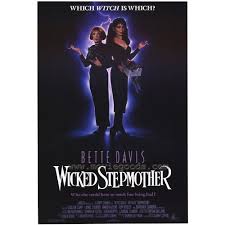
WICKED STEPMOTHER
US, 90 1988, 86 minutes, Colour.
Betty Davis, Barbara Carrera, Colleen Camp, David Rasche, Lionel Stander, Evelyn Keyes, Tom Bosley.
Directed by Larry Cohen.
Wicked Stepmother is one of those films that has to be seen to be believed. It had considerable problems in production, especially with its star, Davis, Bette Davis, in her final role. The structure of the film had to be altered around the scenes that she shot. She disappears from the film in the latter half but there is a list of the cast at the end, with some scenes, which gives her the last image of the film.
The film was written and directed by Larry Cohen, writer and director of a number of thrillers like It’s Alive, God told me to as well as a film on J.Edgar Hoover.
The plot is rather preposterous. The film opens with an over-excited examination of a room where a family seems to have disappeared. However, they are found under the bed miniaturised in a shoe box. The officer in charge is played by Tom Bosley, suspended by the authorities because of his story. He decides to investigate by himself, the clues lead to witchcraft and he enrols in a course examining spells and other witches’ behaviour.
In the meantime, Colleen Camp and David Rasche return from their holiday only to find that their father, Lionel Stander, has married while they are away. And there is his new wife, an exceedingly gaunt Bette Davis, with a forceful red wig. She has taken over the house, persuaded her new husband to spend his time watching TV games programs and has rearranged the whole house, offending Colleen Camp mightily. David Rasche becomes more amenable.
The wife’s name is Miranda and she wants to go to court to see Rasche in action. Instead, Barbara Carrera arrives as Priscilla, exceedingly glamorous and seductive. She turns up at the house saying that Miranda has gone to San Francisco for a week. Furthering suspicions is the presence of a cat in the house with Colleen Camp allergic to cats.
The son, Michael, get into difficulties with bullying at school but Priscilla turns up and endows him with powers that knock out his opponents – and she makes him promise to like his new grandmother. In the meantime, she seduces Rasche who is shocked at what is happening. Colleen Camp tries all kinds of methods and then realises that Miranda and Priscilla are one person and a medium, played by veteran Evelyn Keyes, explains how the two people operate, one in real life, when the other is in the cat.
This leads to absolute mayhem in the house and its collapse, and the capture of the cat – only Miranda/Priscilla are still operating - and the film ends with Tom Bosley in his car being miniaturised!
A very strange way for Bette Davis to finish her film career.
Published in Movie Reviews
Published in
Movie Reviews
Tagged under
Saturday, 18 September 2021 19:48
Passenger 57
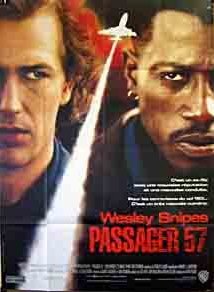
PASSENGER 57
US, 1992, 87 minutes, Colour.
Wesley Snipes, Bruce Payne, Alex Dachter, Tom Sizemore, Elizabeth Hurley, Bruce Greenwood.
Directed by Kevin Hooks.
Passenger 57 is a brief, action-packed thriller on board the jumbo jet. It is in the vein of the Die Hard series, the individual who is able to confront the criminals and save people.
Wesley Snipes was in his heyday at this time, appearing in many action films. He is matched by Bruce Payne as an insane villain, with a cohort of associates including, of all people, Elizabeth Hurley posing as a flight attendant. Tom Sizemore and Bruce Greenwood appear as executives of the aviation company.
Bruce Payne is a ruthless terrorist, arrested, organising his escape as he was escorted by FBI agents on a flight. In the meantime, Wesley Snipes is John Cutter, a security expert, grieving over the death of his wife in a hold-up in a store. He coaches crews in security methods and finds himself on a plane to take up an official job with the aviation company. He handles the situation on the plane but also, on landing, he is out of the plane and coordinates activity for the final confrontation.
The film was well paced, even though it is just another of the airline terrorism dramas.
1. An exciting air adventure? Hijacking planes? Security officers? Pilots and attendants? Handling the situation? The activity of the terrorists? On the plane, on the ground? All in a brief running time?
2. Wesley Snipes as action hero, screen persona, strong character, the touch of vulnerability with the death of his wife, his anger at himself, his friends persuading him to take the job, on the flight, rising to the occasion, heroics?
3. John Cutter and his situation, the training situation being filmed, the reaction of the attendant? Sly, the discussions about his taking up the job, his meeting with the CEO? Agreeing to take the job? To fly to Los Angeles? The discussions with Sly?
4. The introduction to Rane, the plastic surgery, killing the surgeon, escape from the hospital, the chase, his violence, ruthlessness? The arrest? The interrogation? His arrogance? The background of his family, his father, madness? His lawyer, his attacking him and making him say that he was not insane? In the cell? The sudden transfer to Los Angeles, being put on the plane, the FBI agents, not notifying the aviation company?
5. On the plane, Cutter and the edge, his apology to Marti, her putting him with the talkative passenger? his going to the toilet? In the toilet when the hijack began? Rane in the plane, sardonic remarks, playing games with a little boy and shooting, his co-passenger? The attendance, Marti and her poise, chatting with Sabrina, English, the first flight? The plane taking off as normal?
6. The hijacking, the violence, Rane shooting the passenger, his associates? Sabrina and her relationship with him? With the gun? Cutter and his shrewdness, the phone call to Sly, the company on alert? The CEO and his reaction? Silence if it was a failure? Press release if Cutter succeeded?
7. Cutter and Marti going below, the encounter with Vincent, his attack? Cutter and his idea of jettisoning the fuel? Rane and his shooting the pilot, the plane coming down, the landing? Cutter and his getting off the plane? His going to the police, not being believed, arrested?
8. The deals, half the passengers leaving, Rane and his associates going to the fair, pursued by Cutter? The chase, the hijacker and his climbing the tower, falling? Rane and his being taken?
9. Rane, his plans, arrogance, the deal for him to be back on the plane, the flight taking off? Vincent and his becoming a sniper? Cutter coordinating, the shooting of the agents? The local sheriff and giving Cutter his wife’s gun, driving him, Cutter getting on the wheels and back into the plane?
10. The confrontation with Sabrina, with Foget, the fight with Rane? Marti participating? The door opening, Rane falling to his death?
11. The FBI, the police, the agents, the head being wounded? The sheriff and his joke about the gun? Sly and the CEO happy? Cutter going off with Marti?
Published in Movie Reviews
Published in
Movie Reviews
Tagged under